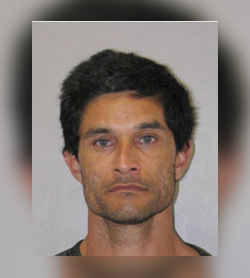LIHUE — The chair of the Kauai police commission is calling out the Hawaii Paroling Authority by saying a recent decision to grant parole to an inmate was based “on overcrowding in the prison.” He also said the parolee would likely reoffend.
Kauai Police Commissioner Charlie Iona in an email questioned the parolee’s release back into the community by stating that the parolee, Jesse Olanolan, “had really (placed) a psychological scare on the community as a whole.”
In 2013, Olanolan was sentenced to a five-year-prison term on two cases after having his probation revoked when he was sentenced in 2004. In that case, he was convicted by a jury on two counts of intimidating a witness, according to reports.
Olanolan had amassed a number of violations on his probation by 2013 and an extensive criminal history, so many that the prosecutor requested consecutive terms, according to reports.
His terms ran concurrent and by April, the HPA had granted him parole.
In May, members of the organizations Citizens Against Thieves wrote letters to Gov. David Ige regarding the Hawaii Paroling Authority with their concerns that Olanolan was in the community.
“I respectfully request that you examine the policies of the members of the Hawaii Paroling Authority,” the letter stated. “Perhaps you should consider naming a new slate of members to the board.”
The letter continued with Olanolan’s criminal history and convictions and questioned whether the board had failed to follow its own administrative rules.
They also corresponded with Tommy Johnson, the paroles and pardons administrator at the Hawaii Department of Safety.
“I appreciated your candor and concerns expressed regarding the release Mr. Jesse Olanolan on parole, and your thoughts regarding the criminal justice system,” Johnson told members in an email. “As explained, at present, parolee Olanolan is being supervised by our Kauai Parole Section. Prior to Mr. Olanolan’s release on parole during late May 2016, he was placed on extended furlough by the Department of Public Safety, which means that he was already living outside of the Kauai Community Correctional Center (KCCC) for some months prior to his release on parole.”
Johnson told the group that if they had evidence that Olanolan has violated the terms and conditions of his release, they could contact his parole officer.
The members were not satisfied, stating that he did not answer their question.
“It does in fact prove that HPA are not following the rules and are only using the parolee’s actions once he is on furlough,” they said in a responding email. “Anyone who has the choice of staying in KCCC or getting a chance to be on furlough and act like an angel to stay out of KCCC will choose the latter. To use this as a reason to release a lifelong criminal is hard to understand. Please have the HPA answer our main question as to why they choose to not follow their own rules.”
That’s when Iona, a former Maui police officer, stepped in to add context to the community’s concerns.
“In these hard economic times, the police department is tasked with doing more with less,” he said in an email. “Keeping this in mind lets me cite a section of the administrative rule that sort of serves as a concern not only for the citizens but the police department as well.”
He cited Hawaii Administrative Rules 23-700-33, which states that parole should not be granted unless there is “reasonable probability that the inmate will live and remain at liberty without violating the law and release not incompatible with the welfare and safety of society.”
He went on to say that given Olanolan’s “record of a life of crime,” the decision to grant him parole is a “hard argument to sell to the average citizen.”
“You or I don’t have a crystal ball, but if I was a betting man, I can bet you this parolee will commit his crimes again,” Iona said. “That is only way of life he has been accustomed to. And as far as the police department. The resources are limited.”
Johnson told The Garden Island that the prison population was not the issue.
“Completion of all recommended programs, good behavior while incarcerated, employment, and providing the offender’s release is compatible with the safety and welfare of the public,” Johnson said. “No offender is ever provided parole based on overcrowding issues.”
He said that the parole board had set a minimum term for Olanolan five-year sentence to three years.
“He was released on parole effective May 26, 2016, after serving approximately three years and eight months of his 5-year maximum term,” Johnson said. “He met all of the criteria for parole and participated in all recommended programs while incarcerated. His 5-year maximum term will expire on Sept. 11, 2017, at which time, he will be discharged from parole supervision.”
The HPA has 47 parolees on Kauai, Johnson said.
According to PSD’s end of month population report for May, there were 1,197 inmates at Oahu Community Correctional Center. The jail has bed space for 954 inmates.


